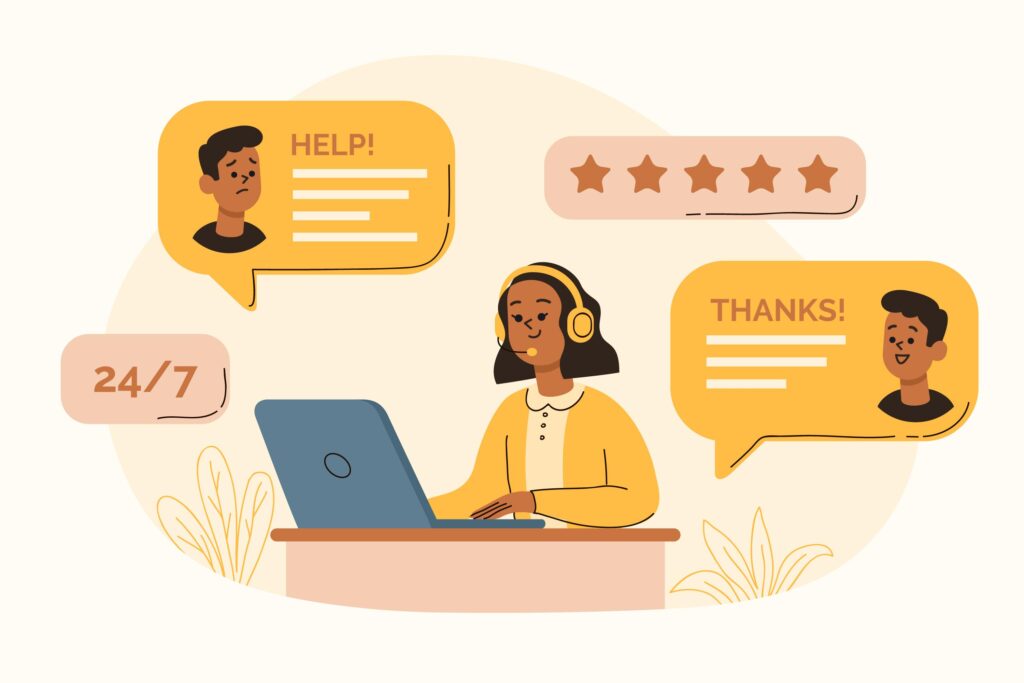In today’s competitive business world, providing world-class customer service is essential for companies that want to thrive and grow. Not only does it lead to happier customers, but it can also boost sales, improve customer loyalty, and enhance a company’s reputation. In this article, we will discuss how world-class customer service can generate happier customers and explore some of the key elements of excellent customer service.
Firstly, let’s define what we mean by “world-class customer service.” It refers to an approach to customer service that goes above and beyond what is expected, providing customers with an exceptional experience that leaves them feeling valued and satisfied. World-class customer service is not just about resolving problems or answering questions; it is about creating a positive emotional connection with customers and building relationships that last.

One of the key benefits of world-class customer service is that it generates happier customers. When customers receive excellent service, they feel appreciated, respected, and valued. They are more likely to develop a positive emotional connection with the company, which can lead to greater loyalty and advocacy. Happy customers are also more likely to recommend the company to their friends and family, helping to grow the customer base and increase revenue.
Another benefit of world-class customer service is that it can boost sales. Customers are more likely to make a purchase when they feel confident in the company’s ability to provide excellent service. By providing exceptional service, companies can increase the likelihood of repeat business and customer referrals. Additionally, happy customers are more likely to spend more money, as they are willing to pay for the peace of mind that comes with knowing they are dealing with a company that values their satisfaction.
A third benefit of world-class customer service is that it can enhance a company’s reputation. In today’s connected world, news of excellent customer service spreads quickly through social media, review sites, and word of mouth. Conversely, poor customer service can lead to negative reviews, loss of business, and damage to the company’s reputation. By providing exceptional service, companies can create a positive image that attracts new customers and reinforces the loyalty of existing ones.
So, how can companies provide world-class customer service? There are several key elements that are essential for delivering exceptional service:
Empathy: World-class customer service starts with empathy. Customers want to feel understood and heard, and empathetic service representatives can put themselves in the customer’s shoes and respond accordingly. Empathy involves active listening, responding to the customer’s needs, and showing genuine concern for their situation.
Responsiveness: Customers want quick and efficient service. They don’t want to be kept waiting on hold or passed around from one representative to another. Companies that are responsive to customer inquiries and concerns are more likely to generate happy customers.
Communication: Effective communication is essential for world-class customer service. This involves being clear and concise in your communication, using appropriate language, and providing customers with the information they need in a timely manner. Communication should be friendly, professional, and personalized to the customer’s needs.
Knowledge: Service representatives should have a deep understanding of the company’s products, services, and policies. This allows them to answer customer questions accurately and provide effective solutions to problems. Companies that invest in training and development for their service representatives are more likely to provide world-class customer service.
Flexibility: Customers want to feel like they are being treated as individuals, with unique needs and preferences. Companies that are flexible and willing to accommodate customer requests are more likely to generate happy customers. This involves being willing to adapt to the customer’s needs and preferences, rather than imposing rigid policies and procedures.
World-class customer service is essential for companies that want to generate happy customers, boost sales, and enhance their reputation. By focusing on empathy, responsiveness, communication, knowledge, and flexibility, companies can create.
World-class customer service and a Customer Relationship Management (CRM) system are closely related. A CRM system is a tool that businesses use to manage their interactions with customers and potential customers. It helps companies to organize and automate customer-related processes, from sales and marketing to customer support and service. Here are some ways in which a CRM can help businesses to deliver world-class customer service:
Personalization: A CRM system allows businesses to store and manage customer data, including purchase history, preferences, and interactions with the company. This data can be used to personalize interactions with customers, such as providing personalized product recommendations or addressing customers by name. Personalization can make customers feel valued and appreciated, leading to a more positive experience.
Customer Service Efficiency: A CRM system allows businesses to track customer support requests, from initial contact to resolution. This enables companies to respond to customer inquiries more quickly and effectively, improving customer satisfaction. Additionally, CRM systems can automate routine customer service tasks, such as sending confirmation emails or processing returns, freeing up staff to focus on more complex issues.
Consistency: A CRM system can help businesses to maintain consistency in customer service across all channels, including email, phone, and social media. This can ensure that customers receive the same level of service, regardless of the channel they use to contact the company. Consistency in customer service can build trust and credibility with customers, leading to greater loyalty and advocacy.
Follow-up: A CRM system can help businesses to follow up with customers after a purchase or service interaction. This can include sending thank-you emails, asking for feedback, or offering additional products or services. Follow-up can demonstrate a company’s commitment to customer satisfaction and provide opportunities to upsell or cross-sell.
Proactive Outreach: A CRM system can enable businesses to proactively reach out to customers with targeted marketing campaigns or promotions. For example, a company might use customer data to identify customers who have not made a purchase in a while and offer them a discount or special promotion. Proactive outreach can help businesses to retain customers and generate new sales.
In conclusion, a CRM system can be a powerful tool for businesses to deliver world-class customer service. By leveraging customer data, automating routine tasks, and maintaining consistency across channels, businesses can improve customer satisfaction, loyalty, and advocacy. Additionally, a CRM system can provide opportunities for proactive outreach and follow-up, enabling businesses to build stronger relationships with their customers. By using a CRM system effectively, businesses can set themselves apart from their competitors and provide a customer experience that truly stands out.




